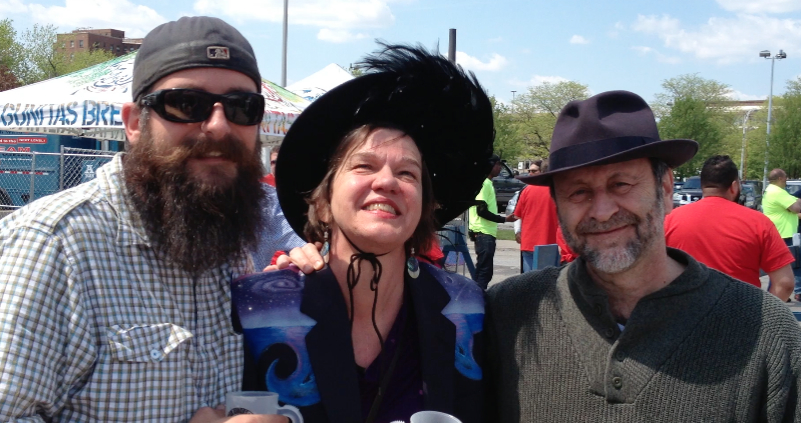Ten years ago the City of Chicago’s Commissioner on Aging contacted me to lead a memoir class at the Chicago Cultural Center. Soon afterward, Chicago Public Radio asked if I’d write and record an essay about the writers who’d signed up. I used my talking computer to e-mail my rough draft to the WBEZ editor and she emailed back with only one suggestion. “You repeat the word ‘seniors’ too much,” she said, requesting I use a “gentler” word. When I couldn’t come up with one, she wrote back. “How about golden agers?”

That’s writer Hanna Bratman, 94, the matriarch of the memoir classes I lead. Her essays have been compiled in a book called “What’s In My Head.” (Photo by Nora Isabel Bratman)
Golden agers? Was she serious?
She was. My recording of the piece is not available online, but I have a CD of it, and if you listen very closely you can hear me choke every time I call the writers “golden agers.”
Turns out the editor was ahead of her time. Just this week on Morning Edition, NPR’s Ina Jaffe opened a series she is doing about older Americans by explaining how difficult it’s been for her to find the right words to describe people who are over age 65.
“I realized what a minefield this was after I’d been on the beat just a few months,” she said, describing a profile she’d done recently of a 71-year-old midwife who is still up all night delivering babies. The headline on the NPR web site used the word “elderly” to describe the midwife. “Listeners were furious,” Jaffe said. “Maybe once upon a time, ‘elderly’ referred to a particular stage in life, but now people think … it means you’re ailing and you’re frail.” Jaffe said she sometimes uses the words older adults or older Americans but has pretty much given up senior. “I’ve met some older people who don’t like that, either,” she said. “And ‘senior citizen’ really seems to annoy just about everyone now…there really aren’t a lot of widely acceptable terms anymore.”
The piece went on and on, and on and on and on, with all sorts of other ideas:
- Golden years: Jaffe explained this term came from a sales pitch during the late 1950s, when retirement began to be romanticized as a perpetual vacation.
- Silver tsunami: I’d never heard of this, but NPR actually referenced a guy named Ashton Applewhite about this one. Applewhite blogs about aging and ageism and argues the metaphor is wrong. The 65-and-over population growth is not a tsunami, he says. “It’s a phenomenon that is washing gently across a flood plain.”
- Our seniors: A term often used by politicians. Jaffe finds it patronizing. “The only other group we talk about like that is children.”
- Successful aging: Jaffe is over 65 years old herself and says that although this is considered a progressive term, she doesn’t like it. “I think it just means there’s one more opportunity for me to fail.”
I do not research ageism, and I don’t have a degree in aging. I do lead three memoir-writing classes a week, though, and while a couple of my students are still in their fifties, most are in their seventies. Two students, Wanda and Hanna, are in their nineties and still manage to get to class on their own each week with new essays to share. Listening to all these amazing people read their essays teaches me a lot — far more than any of them will ever learn from me!
So what word do I use to describe the people who sign up for my memoir-writing classes? That’s easy. I just call them writers.
 People have been asking me if I’m excited about the “driverless car” Google is working on. Truth is, I don’t miss driving that much. Mike and I live in a neighborhood in Chicago so close to downtown that I can walk or take a train, cab or bus just about anywhere I want to go. Parking costs a lot here, so many of our neighbors who can see don’t have cars, either.
People have been asking me if I’m excited about the “driverless car” Google is working on. Truth is, I don’t miss driving that much. Mike and I live in a neighborhood in Chicago so close to downtown that I can walk or take a train, cab or bus just about anywhere I want to go. Parking costs a lot here, so many of our neighbors who can see don’t have cars, either.


